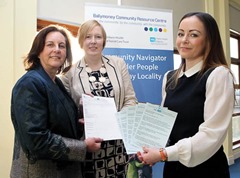Innovation in services
 agendaNi summarises how new thinking is helping to improve health and care for the older population.
agendaNi summarises how new thinking is helping to improve health and care for the older population.
Despite criticism, the Transforming Your Care programme has resulted in the Health Service rethinking how it serves older people. As a result, a number of entirely new services have been set up.
In Ballymoney, a new post of ‘community navigator’ has been established. In this role, Bronagh McFadden helps to ensure that patients leaving hospital have other people around them to support them.
In the first instance, she may be contacted when by a social worker on behalf of a stroke patient who is being discharged from hospital. She would then arrange for a key safe to be fitted (so that carers can get access to the patient’s home) and also for checks to improve security around the house and reduce their risk of falling.
Another example is a pilot project to treat glaucoma more effectively. The condition results in a build-up of fluid within the eye which can damage the optic nerve and retina. Treatment, usually by using eye drops, normally takes place in hospital – after a referral by an optometrist – but a new glaucoma clinic is providing the service in the community at the Shankill Road’s health and well-being centre.
The Belfast Health and Social Care Trust helps optometrists to purchase specialist equipment for their practices. They can then increase the accuracy of their eye examinations by working with eye consultants in the clinic.
“It is great to get all my tests undertaken and receive the results on the same day and to know what treatment I require,” says John Perry who lives in Armagh and was referred to the service. “Having everything done on the same day suits me as I don’t have to travel all over the place to have tests carried out at different times and locations. I also don’t have to take as much time off my work and I’m receiving my treatment much quicker now.”
The Ards Integrated Care Partnership’s pilot project on palliative and end-of-life care is giving patients more choice regarding their care, treatment and place of death. This involves working with five GP practices to avoid unwanted hospital admissions where possible.
An ‘acute care at home’ team is up and running in the Southern Health and Social Care Trust. This helps older people to manage unexpected illness in their own home rather than needing to go into hospital. GPs refer patients to this team and it also helps paramedics to provide the same service when they are called out. The service is due to be extended to all other trusts by the end of 2015.
Where an admission is necessary, the team will work to ensure that the patient is transferred directly to an assessment unit – thus avoiding A&E – and that they subsequently receive a tailored care package to help them recover.
Reablement has, since September 2012, helped 11,333 people to regain their independence after a stay in hospital. Its roll-out is continuing i.e. intensive short-term help after leaving hospital so that people can perform necessary daily tasks (such as walking and cooking). Integrated care partnerships in the west of the province have set up an ‘integrated falls prevention pathway’ whereby people aged over 65 who have fallen in their home will be referred by their GP to a 10-week ‘Stepping On’ programme. This includes an individual falls assessment, referrals to other services (as appropriate), advice on accident prevention, nutritional information and enrolment in a six-week exercise class to improve their strength and balance.





